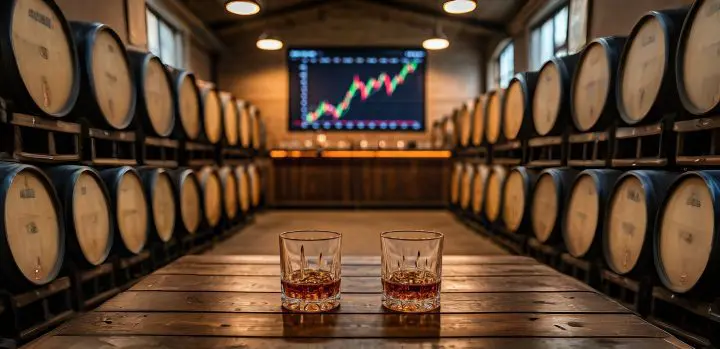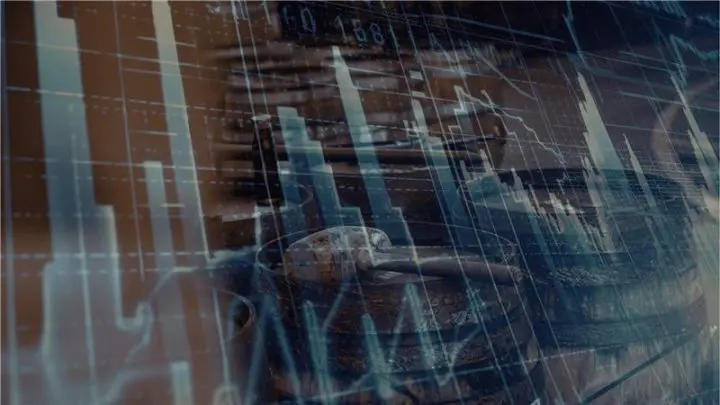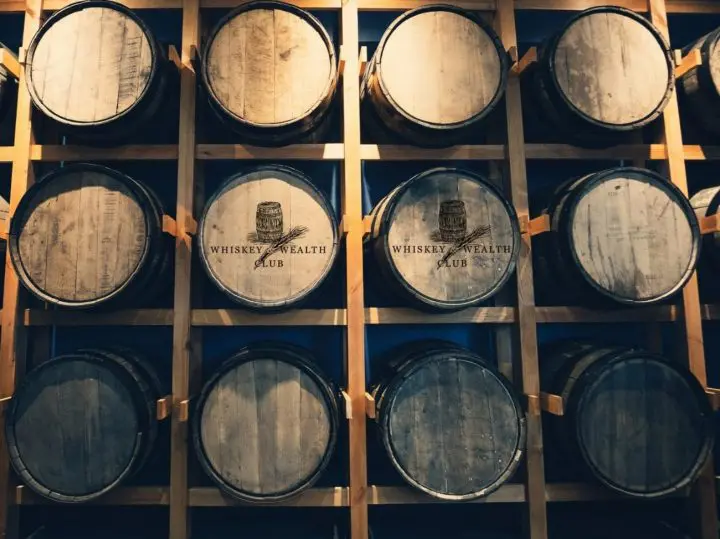
Investing in Whiskey Casks – How it Works and Why it Appeals to a Growing Number of Savvy Investors
Why you should be investing in Whiskey Casks.
With its asset-backed nature and increasing demand, investing in whiskey casks has the potential to provide significant long-term returns. Learn why savvy investors are turning to this thriving market amidst the global economic crisis.
Want to know how cask whiskey investment works? We share an overview of how it works and why it is turning the heads of investors. As well as answering the key questions we get from investors.
The current market
The current global financial state of affairs is a sorry one for investors. Across the world, market values have plummeted, and economies have shrunk. The IMF has slashed growth forecasts for 2020 and claimed the global economy is on course to suffer the worst financial crash since The Great Depression of the 1930s, after shrinking by 3% in April.
With financial markets experiencing such a significant fall, investors are increasingly looking to secure their wealth through alternative investments such as whiskey.
Since the UK lockdown was established in March, investment in cask whiskey has continued to grow. This is despite being in the midst of a global financial crisis. In total, investors have spent £3.5m buying casks wholesale through Whiskey and Wealth Club, equating to 197.5 pallets or 1,185 casks.
Why are investors turning to cask whiskey as a buy and hold strategy?

The Whiskey & Wealth Club team visit a partner distillery in Scotland
Investing in whiskey casks has several advantages as opposed to traditional investments, such as stocks and shares, particularly in the current economic climate. Whiskey is not directly tied to any financial markets. Therefore, it is not as significantly affected by shocks such as economic recessions. However, supply and demand can definitely play a role. Whiskey casks are also asset-backed, with investors purchasing a tangible commodity which they will own. The value of the whiskey itself is largely determined by its age and brand and will increase over time.
In recent years, whiskey popularity with investors has continually grown. In 2020, rare whiskey topped the Knight Frank luxury investments index, rising by 564% in value over the last decade. The individual sale of casks is also growing in popularity. The value of interest for Scotch whisky casks by investors is already estimated at $40m according to the IWSR, the global benchmark for wine and spirit data.
Does the market growth differ for Scottish and Irish whiskey?
Currently, Irish whiskey is in the midst of a resurgence after experiencing a major decline in the past century. This saw the industry almost completely collapse. Today, the industry is back on its feet. Irish whiskey is now the fastest-growing premium spirit in the world. Its exports have grown to 300% in the past decade, and the market is worth $1bn in the US alone. With demand for Irish whiskey soaring, the industry is a sleeping giant.
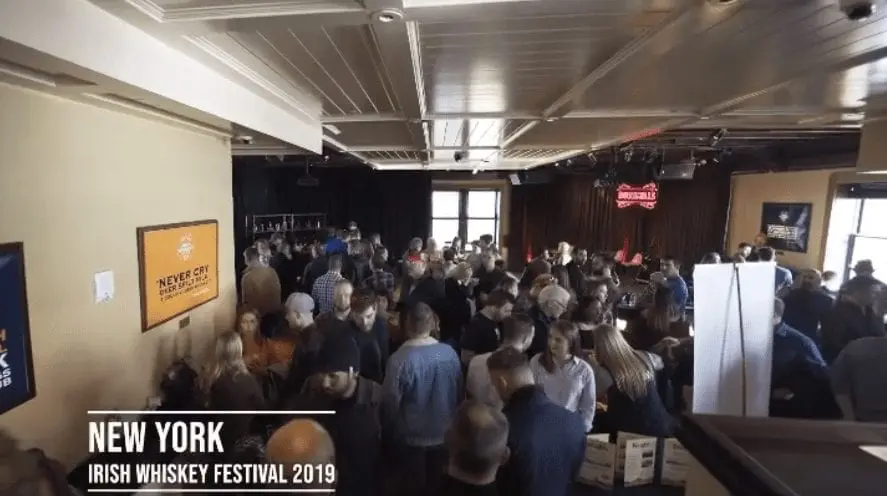
The Whiskey & Wealth Club team head to the United States, attending New York’s Irish Whiskey Festival
Scotch on the other hand, currently holds market dominance. A position it has held since the early twentieth century. For the last 100 years, Scotch has been the world’s biggest producer of whisky. There are currently over 20 million casks maturing across the country. Last year, Scotch exports were valued £4.91bn, equating to over 20% of all the UK’s food and drink exports.
Despite the current predicament of global financial markets, cask whiskey investment bucks the trend. It continues to grow in favour with investors. In the H1 2020, €7.8m has been purchased in cask whiskey through Whiskey Wealth Club. This is double from the same period last year. Which crucially is supporting distilleries at this testing time.
Why do distilleries need investors?
Distilleries will produce new make spirit, which has to be transferred into casks for the maturation process. Ideally, this is between 5 and 10 years. The whiskey-making process itself is capital and labour intensive. Notwithstanding the fact that distilleries must wait years to sell their whiskey to make profits, due to the ageing process.
To help cover these costs and raise capital, distilleries will sell some of their casks to individuals or funds. Typically, this was reserved for a select few who would purchase whiskey casks direct from the distilleries. However, this market has now been opened up to more investors through brokers such as Whiskey and Wealth Club, which can acquire casks at heavily discounted rates.
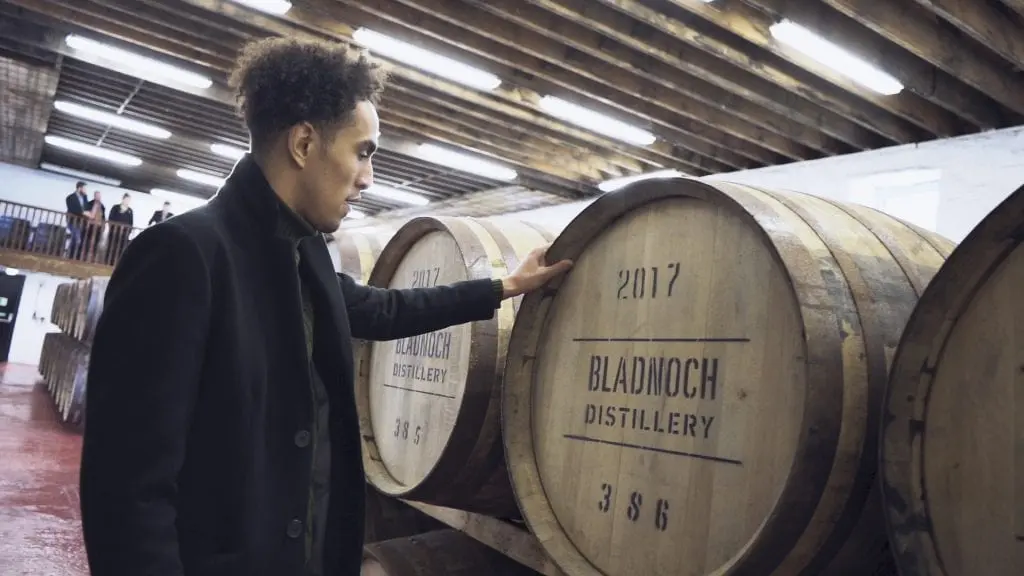
Senior Account Manager, Mo Elkhiyari, visits Bladnoch distillery
How does buying and holding cask whiskey work?
Once purchased, casks are stored in a government bonded warehouse. Ideally, they are held between 5 to 10 years, where they are fully insured. Each cask contains approximately 200 litres of whiskey. The ownership and titles are then given to the investor as the asset owner. The insurance on each 200-litre cask whiskey increases year on year in line with the value, covering downsides.
What are the returns on cask whiskey investment?
The value of premium whiskey is largely determined by age, as well as the quality of the distillery and brands they release. Considered to be the most valuable, Single Malt and Single Pot Still whiskies occupy the higher end of the spectrum, compared to blended whiskies. While all whisky increases in value over time, some increase more than others.
Working on an exclusive basis with leading distilleries really gives a strong value add to Whiskey & Wealth Club clients. Combine this with the fact that cask whiskey is an asset based-investment not tied to financial markets, makes it ever-appealing.
With expected returns ranging depending on the length of the investment, we estimate conservative returns at 16.1% p/a. Or, an annualized ROI at 10.11% p/a.
This is based on a purchase price of £12,600 per pallet of whisky. A pallet contains 6 casks, therefore a cask price is £2,100. Using today’s exit price on a pallet of 10-year-old non branded single malt Scottish whisky at £33,000, the total ROI is 161.90% over 10 years. The investment gain is £20,400 on top of your initial £12,600. A 16.1% return. Given the 10 year hold time, an annualized ROI to help compare against shorter-term investments, this equates to 10.11% per annum.
What exit strategies are available?
Once matured, investors have several options when it comes to deciding their exit strategy. One such strategy is selling mature stock to existing brands and new distilleries, who will be in search of matured spirit to bottle and sell to consumers. With the predicted growth of the Irish whiskey market, several brands will be looking to boost their stocks. Investors holding casks could be key to this. In some instances, the distillery where the casks were originally purchased may also buy back the spirit they originally sold. Some even require a “first right of refusal” clause to ensure they get the opportunity to buy back their casks. In Scotland, several whisky brokers buy and sell daily. Ireland will be no different in years to come, giving yet another exit option to sell to a whiskey broker, whereby the broker will then go and sell for a higher fee.
Branded whiskey will sell for higher premiums to independent bottlers such as The Single Malt Whisky Society. There are hundreds of such IB’s like Berry Bros & Rudd, Single Cask and so forth. In fact, there are even annual awards held for these organisations to see who can source the best casks and release them.
This is why Whiskey & Wealth Club specialize is dealing with branded distilleries to help increase the long-term ROI for clients. This results in far more exit options than you would get by buying commercial non-branded whiskey.
Should investors sell to private collectors?
Another exit strategy for private investors is to sell to other private collectors or investors. The investors intend to bypass the early part of the maturation process, purchasing whiskey which has already been aged, by say, five or 10 years. After 10 years whiskey becomes scarcer due to the fact that 97% of all Irish whiskey being sold is between the ages of three to eight years old, while 90% of Scotch being sold is between three to 10 years old.
As mentioned, starting at year 10 for some investors is desirable. This provides another outlet for early investors who bought it off the still and want to exit at year ten. Lastly, private bottling and labelling is also an option. This comes at a cost of usually €4- €6 a bottle for things such as the cork/closure, the bottle, the label, the design, the bottling fee and so forth, however, could see strong returns in the long run.
Discover more about cask storage. Speak to one of our team today!
Do investors have to pay tax on cask whiskey?
The wholesale of whiskey is subject to excise duty and VAT. However, casks held under bond do not come under the same rules. When purchasing casks in Ireland, a wholesale licence is not required as long as the casks are sold in multiples and exceed the wholesale threshold of 0-200 gallons. When selling quantities within the 0-200-gallon threshold, a wholesale licence is required. A pallet of whiskey which is six casks is roughly 270 gallons. Therefore, it doesn’t require a wholesale licence. Hence why the minimum purchase from Whiskey & Wealth Club is one pallet.
Should an investor’s quantities be below six casks, a wholesale license can be applied for, costing just €500 from the Inland Revenue. However, the casks do not need to be taken out of bond when exiting. A retailer’s licence, which can start at €80,000 and go upwards with legal fees, is not required unless investors wish to establish their own retail outlet. Those bottling their whiskey can sell wholesale through third party retailers, specialist websites or direct distributors to bars and restaurants. This will require the mentioned wholesale license at a cost of €500. Most Whiskey & Wealth Club investors will opt to sell in the cask while it’s held in bond. This negates the need to pay roughly €6,000 in customs and duty per cask. Investors simply hold the cask for as long as they wish. Then release while still under bond to the new owner.
Does it differ for Irish whiskey and Scottish whisky?
With Irish whiskey, the first five years are paid for by Whiskey and Wealth Club, and with Scotch the first 10 years are paid for. Each additional year investors hold their casks in bond past the “prepaid term”, will cost roughly €50 per cask for storage and insurance. When individuals are ready to sell, they simply sell the casks to someone else. Examples, as stated above, include whiskey brands, another private investor, private bottlers, whiskey auction websites (of which there are 15 and growing) or a distillery low on stock. The casks stay in bond under the new owner. The new owner(s) will then take on all customs and duty obligations at this point. When the new owner such as a whiskey brand is ready to bottle, they then pay the customs and excise duty on the casks to remove from bond and sell as a finished bottle of whiskey.
Is cask whiskey FCA regulated?
In the UK, FCA does not currently regulate the wholesale buying and selling of cask whiskey. The buying/selling of cask whiskey falls under HMRC regulation. Whiskey & Wealth Club, however, aim to adhere to as many of the standard FCA checks as possible. Before accepting an individual or entity as a client, we conduct various extensive checks including Anti-Money Laundering (AML) and Know Your Customer (KYC). We have a full due-diligence protocol in-house.
We also ensure we are dealing with a reputable distillery and excise warehouse who must follow strict laws imposed by HMRC. Using HMRC approved cask accounting systems such as DRAMS to make sure no cask number can be duplicated. This technology also gives full visibility of maturing whisky – down to the location of every cask. With audit trails to keep records in order, and DRAMS even completes Government Excise Reports.
Amongst other checks and balances like HMRC distillery audits, regular site visits from Whiskey & Wealth Club and our clients, and through many other regulations, we can ensure clients holding casks are protected.
We also recommend that clients speak to an independent financial advisor when considering purchasing cask whiskey as part of a buy and hold strategy. As cask whiskey, like any other asset class, can go down as well as up in value. Whiskey & Wealth Club does not offer any guarantees on the potential future growth of the whiskey. We can, however, offer guidance on the suitability of cask whiskey to a buy and hold strategy.
What licenses do Whiskey & Wealth Club hold?
The UK has a well-established secondary whiskey market. HMRC regulates this and so firms dealing in wholesale whiskey brokering must hold appropriate licences with HMRC and undergo a rigorous application process to do so. A licence called a WOWGR must be held. Should any firms you speak to not have a WOWGR, buyer beware. Whiskey & Wealth Club took exactly 8 months using the top specialists in the country to attain a WOWGR. It’s not an easy process. It requires in-person interviews with HMRC, site visits, background information, business plans and applications the size of a phone book. Additionally, we have strict processes in place ongoing to meet the standards HMRC sets out.
We’re regulated for the information we store, where it’s stored and how it’s stored. Far deeper than the usual GDPR regulations. We invested over €150,000 to upgrade our office to a fully paperless operation with a custom-built CRM to adhere to these strict regulations.
Why should I invest with Whiskey & Wealth Club?
Whiskey and Wealth Club only purchase casks of premium new-make Single Malt or Pot Still spirit at discounted, bulk wholesale rates from the finest distilleries and whiskey brands in Scotland and Ireland. Typically, if these casks were to be purchased directly from the distilleries or brands, they retail from €5,500 up to €8,000 per cask. Through Whiskey and Wealth Club, these can be purchased at a far more cost-effective rate due to economies of scale. The discount starts at 55% and can go as high as 75% from the retail standard based on the volume that is purchased.
We recommend that clients speak to an independent financial advisor, when considering purchasing cask whiskey as part of a buy and hold strategy. Like any other asset class, cask whiskey can go down as well as up in value. Past performance does not guarantee returns. Our team can, however, offer guidance on the suitability of cask whiskey to an investment portfolio.
How safe are the returns when buying cask whiskey?
Naturally, an element of risk is present, and returns cannot be guaranteed. Risks include:
- Demand slowing down and prices dropping as a result
- Oversupply of the market
- A warehouse fire (our insurance covers this)
- Rules and regulations change requiring investors to seek new licences to sell
- Alcohol becoming outlawed in certain countries
- An outbreak of major conflicts which could create difficulty for global exports
Once casks have been purchased, investors receive a certificate of ownership. This is a legally binding document confirming their ownership. In some cases (depending on the bonded warehouse) they also receive a bonded warehouse storage certificate relating to each cask number. This also confirms storage fees have been paid in full.
In Ireland, we purchase the casks under our bonded tenancy agreement with the Irish Revenue Commissioners and the excise warehouse. We then have a legal contract in place. Granting our clients full, beneficial and unencumbered ownership of each cask purchased. We simply hold them in trust under our tenancy until such a time as our clients wish to sell.
What lies ahead for the whiskey industry?
Experts predict the growth of Irish whiskey to continue in double digits for at least another 20 years. The IWSR (International Wine and Spirits Record) which is the global benchmark for alcohol and beverage data, predicts Irish to outgrow Scotch and bourbon. The IWA (Irish Whiskey Association) anticipates the market to double in the next 10 years.
Scotch is a great category in that Single Malt sales are rising annually in what is the world’s most stable whisky market. Therefore, it is another very safe play to be holding maturing Scottish Single Malt casks for the future. Demand is soaring for it.
Investors should always be mindful of the risks that are present. Despite this, whiskey presents excellent opportunities. It is rapidly growing and winning global awards. Demand is surging, yet supply is yet to bridge this gap. We’ve always thought of Irish whiskey as liquid gold – and it’s great to see consumers and investors around the world turn their heads back towards it.
Whilst cask whiskey is alternative, the core fundamentals of investing still apply. Undertake your own research and due diligence. When considering investing in alcohol like whiskey casks, make sure you’re fully aware of just what you are purchasing and seek expert advice beforehand.

Whiskey experts Jay Bradley & Scott Sciberras celebrate the UKBA2020 win
What does the future look like for Whiskey and Wealth Club?
Since we founded in 2018, Whiskey & Wealth Club has grown into a successful and respected company. We have a proven track record; with over 500 happy clients, reflected in our 4.8 TrustPilot rating. Our business has been covered by respected titles such as Spirits Business, The Scotsman, Drinks Insight and The Sunday Telegraph. As well as The Times, The Irish Independent, The Business Post and Yahoo! Finance. Whiskey Wealth Club has been recognised by numerous awards; four at the 2020 UK Business Awards – for Insurance/ Banking and Financial Services and small-medium enterprise – and second place at Growing Business Awards 2019.
